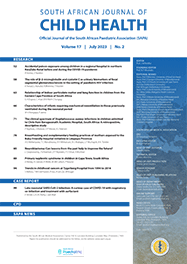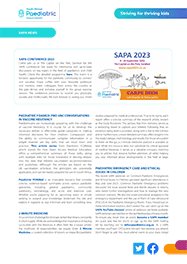Articles

Magnitude and driving factors for female genital cuttings in-school girls of Addis Ababa, Ethiopia: a cross sectional study
Abstract
Methods: A cross-sectional study design with analytical component was employed to study the randomly sampled primary in-school girls drawn from school communities of Addis Ababa between August and June, 2008. A total of 407 in-school girls selected from four primary schools and their respective families were recruited. Data were collected through self administered and open ended questionnaire and analysed using bi-variate and multivariate models.
Results: The magnitude of female genital cutting was 26.0%. The majority (62.2%) was circumcised in the age group of 10-15 years. About (46.9%) of the FGC were from government school and most (13.4%) of the FGC occurred at the age between one and five years followed by 6-10 years (5.9%) with the median age of 9 years. The majority (19.7%) of them was circumcised by traditional circumcisers followed by health workers 14 (3.4%). Most (38.7%) of the FGC decision was made by mothers and the rest were made by fathers (24.5%), both parents (22.6%) and relatives (14.2%). The odds of subjecting the in-school girls for FGC was 2.7 times higher in government schools, 8.9 times higher in Guraghe ethnicity, 3.4 times higher among girls living with other than their parents, 3.2 times higher in mothers who had no knowledge about the harm of FGC than their counterparts.
Conclusions: FGC practice is prevalent in primary in-school girls of the capital city where better health information exists which underscores the need to reinforce the national anti FGC law. Secondly, focussed awareness creation targeting government schools, Guraghe ethnicity and parents is necessary. Thirdly, Empowerment of women to fight FGC and promotion of parental education is required.
Authors' affiliations
Thewodros Zewde Shay, School of Public Health, Addis Ababa University
Jemal Haidar,
Wambui Kogi-Makau,
Full Text
Cite this article
Article History
Date published: 2010-10-05
Article Views
Full text views: 1519

.jpg)



Comments on this article
*Read our policy for posting comments here